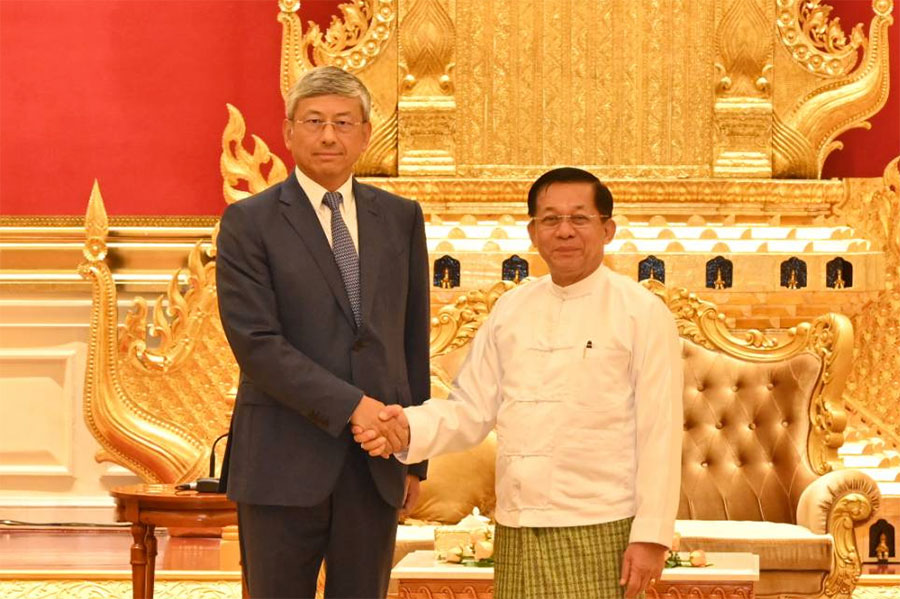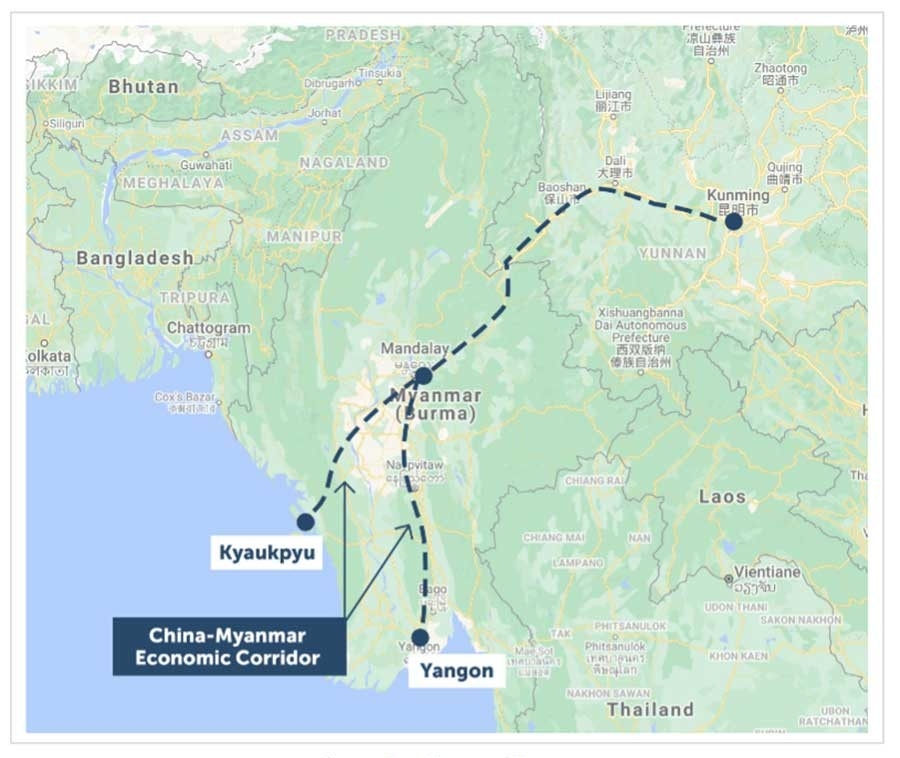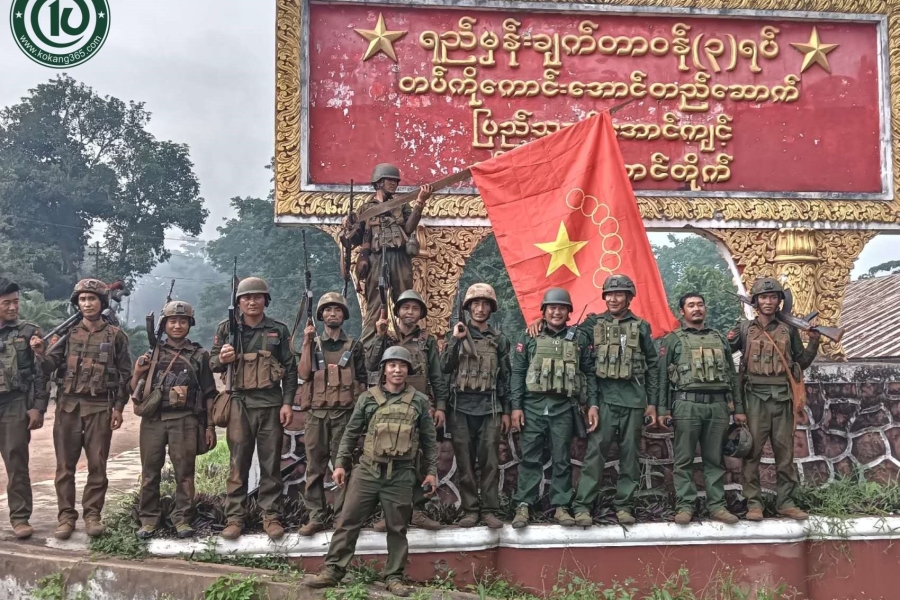- Weekly Highlights from Arakan State (Feb 2 to 8, 2026)
- Arakanese merchants seek access to Indian market via Mizoram trade route
- Education crisis deepens for IDP children in Arakan State
- Coalition forced led by AA advances toward junta No. 16 weapons factory in Bago Region
- A Glimpse Into the 2026 Arakan State Parliament
Megalomaniac Min Aung Hlaing, China's Agenda, and Myanmar's Future
Along with Russia, China is one of a handful of countries that supply weapons to the regime. As China has major oil and gas pipelines that run through Myanmar, Myanmar's stability is undoubtedly important for China.
24 Aug 2024

Written By Maung Khaing Tun (Pyi Thit)
When it comes to political issues in Myanmar, the country's powerful northern neighbour China cannot be left out. Since the military seized power in a coup from the democratically elected government in 2021, Myanmar has descended into a full-blown civil war.
More than three years after the putsch, the regime is still struggling to exert its administrative control over the country. The economy has been decimated, with hyperinflation and unemployment taking a heavy toll on the Myanmar people.
Myanmar's military regime has lost control of more than 70 towns, particularly in northern Shan State and Arakan State, since the Brotherhood Alliance - of which the Arakkha Army (AA) is a member - launched Operation 1027 in October 2023. Many junta troops have surrendered as anti-regime groups have gained strength and territory.
Beijing has been defending the regime on the international stage since the coup, apparently wanting to pave the way for some set of circumstances that would allow the generals to get out of a political crisis of their own making. China has met with former president U Thein Sein twice this year and also invited the junta's second-in-command Soe Win for his first official visit to China since the coup.
Coup-maker Min Aung Hlaing is not happy with the influence China has wielded on the Myanmar military since Than Shwe's reign. After he succeeded Than Shwe as the military chief in 2011, he chose to make his first goodwill visit to Vietnam, even though China and Vietnam were in dispute over territorial issues in the South China Sea. This might have angered Beijing.
Since the 2021 coup, Min Aung Hlaing has tried to hedge the Myanmar military's reliance on China by promoting ties with Russia.
But after the Brotherhood Alliance launched Operation 1027 in northern Shan State in late October of last year, China brokered a series of talks between the warring parties in Yunnan Province. The two sides struck a ceasefire in mid-January. The alliance restarted the armed conflict in late June, however, accusing the regime of repeatedly violating the truce. Fighting has since spread from northern Shan State to Mandalay Region.
As the fighting intensified, Min Aung Hlaing replaced vice president U Myint Swe as the acting president of Myanmar and put leaders of the previous regime, including former president U Thein Sein, who has been involved in talks with Beijing in recent months, under surveillance. The regime also refused to join China-brokered talks that were scheduled for early August, a couple of days before its Northeastern Command in Shan State's Lashio fell to resistance forces led by the Brotherhood Alliance.
China's Ultimate Agenda? An Enduring Enigma
The Chinese government has close ties to the Federal Political Negotiation and Consultative Committee (FPNCC), a coalition of seven ethnic armed organisations based in northeastern Myanmar, near the Chinese border. At the same time, Beijing defends the regime on the international stage, and has signed new investment deals with the regime since the coup.
Along with Russia, China is one of a handful of countries that supply weapons to the regime. As China has major oil and gas pipelines that run through Myanmar, Myanmar's stability is undoubtedly important for China.

China is also implementing a deep-sea port project in Arakan State's Kyaukphyu, which will give it direct access to the Indian Ocean. It is working to build a railway, as well, linking Arakan State with Yunnan Province through central Myanmar and Shan State.
China sees Myanmar as part of its global expansion ambitions, and does not want to see Western countries' influence on the country. Even under the unlikeliest of circumstances, for example, China would maintain ties with Myanmar if an influential member of the pro-democracy movement like Daw Aung San Suu Kyi reassumed a position of power someday.
At the same time, China does not trust or have a good opinion of Min Aung Hlaing. This explains why the Brotherhood Alliance could seize towns in northern Shan State, citing the need to fight scam operations there. Chinese projects have been halted by the renewed hostilities in Arakan State. China definitely wants to see stability in Myanmar, as its interests have been harmed by the post-coup fighting.
China is losing patience with the regime as Min Aung Hlaing has ignored the demands of junta opponents and the five-point consensus of the Association of Southeast Asian Nations (ASEAN). Therefore, China approached former president U Thein Sein and apparently urged him to intervene. Min Aung Hlaing blatantly defied China's expectations by consolidating his grip on power last month, assuming the role of acting president in addition to other positions he holds as the military chief, chairman of the State Administration Council, and prime minister.
Regime Losing Ground
Military chief Min Aung Hlaing seized power on the pretext that there was voter fraud in the 2020 general election, but he was only expanding his powers, without being able to credibly reveal any electoral fraud. The military regime's promise to hold a free and fair election in the coup's aftermath has not been implemented more than three years later. Min Aung Hlaing has been described as obsessed with the idea of becoming president through the election.
At present, the military regime is being attacked by revolutionary forces that have become stronger and more organised throughout the country, and in the first six months of 2024, many townships were surrendered to anti-regime forces. When the territorial advances of resistance forces led by the Northern Alliance, which is close to China, reached Mandalay, the regime rejected Chinese mediation and it was widely believed that retaliation against the resistance forces would follow.
The regime has announced plans to hold elections next year, and is said to have recaptured some of the townships it lost in northern Shan State. Due to the fighting in Shan, the military regime has had to give concessions vis-a-vis some townships in the hands of the FPNCC leader United Wa State Army (UWSA), which has not yet taken a side in the civil war. The UWSA has issued statements calling for peace talks, and proclaiming neutrality in the conflict in Myanmar.
This is an embarrassing situation for the military regime, and there seems to be no way to retaliate against the anti-regime forces in a way that would return control of territory to pre-coup configurations. Despite or perhaps due to these dynamics, it is impossible for the regime to carry out the election they claim to want without political dialogue.
After the 2021 coup, Myanmar's military regime faced armed opposition throughout the country, and by 2023, it was essentially presiding over a failed state. Signs of failed-state status have only accelerated this year.

By estimates generous to the regime, it genuinely controls only a seemingly diminishing-by-the-day half of the country's 330 townships at this point. The region and state capitals remain its strongholds, but in most states and regions, outside of the urban centres, it is no longer calling the shots by metrics that would objectively define any "ruling" governmental entity.
The future of the regime, which has not opened the way for meaningful political dialogue with the anti-coup forces, is an interesting question to ponder, even if they can hold onto enough of the country to hold elections in 2025. No matter what happens, China is sure to play a role in outcomes for both sides of the civil war in Myanmar.






.jpg)













